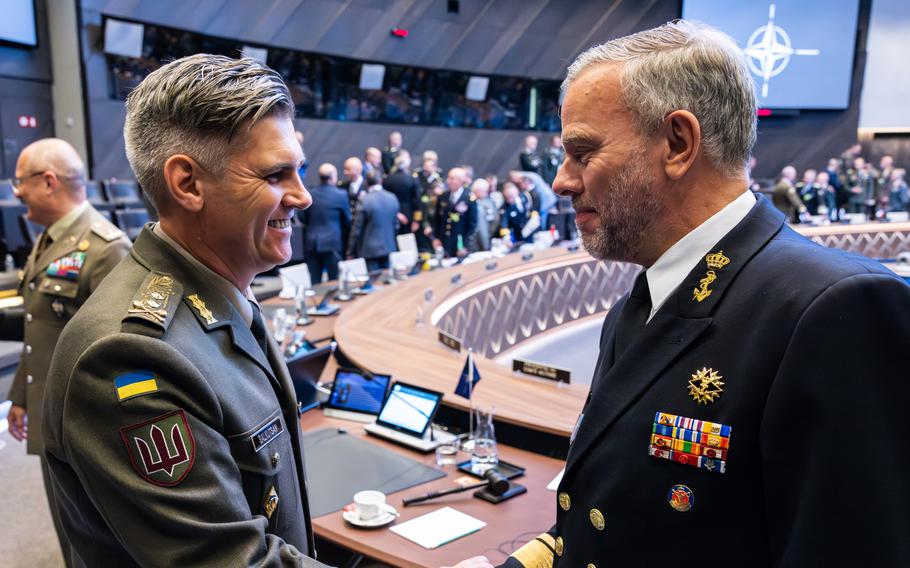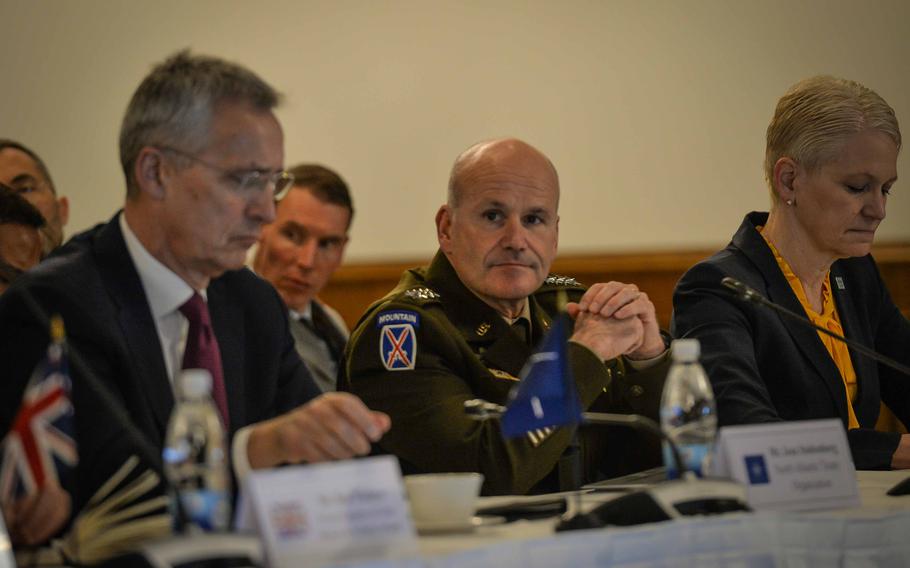
NATO Secretary-General Jens Stoltenberg, center, is flanked by alliance defense officials at NATO headquarters in Brussels on May 10, 2023. Representatives of member countries met Wednesday to fine-tune new defense strategies that are expected to transform how NATO will defend itself. (NATO)
STUTTGART, Germany — U.S. European Command’s Gen. Christopher Cavoli and other top NATO defense officials met Wednesday in Brussels to fine-tune new defense plans for Europe that are expected to transform how the alliance will defend itself for years to come.
The meeting came ahead of a summit this summer in Vilnius, Lithuania, where heads of state are expected to formally approve a strategy that NATO commanders have been hammering away at since the last summit in Madrid a year earlier.
Tailored regional defense plans will strengthen and update the ways allies deter and defend, NATO Secretary-General Jens Stoltenberg said at the start of talks at alliance headquarters Wednesday.
The plans “provide a much more precise requirement for what is needed to help transform our militaries so allies will know exactly what forces and capabilities are needed, including where, what and how to deploy,” he said.

Dutch Adm. Rob Bauer, chairman of the NATO Military Committee, right, greets Ukrainian Maj. Gen. Serhii Salkutsan at a NATO meeting in Brussels on May 10, 2023. Bauer said the alliance will remain staunch in its support for Ukraine in the war against Russia. (NATO)
The defense plans will call for more troops at higher levels of ready-to-deploy forces who can mobilize on short notice, military officials said.
“This change will move us from an alliance that was optimized for out-of-area contingency operations to an alliance fit for the purpose of large-scale operations to defend every inch of the alliance's territory,” Cavoli said Wednesday. “This is necessitated by the new realities we face.”
To bring all the defense plans to fruition, allies will need to invest sufficiently in relevant military capabilities.
Increasing defense spending among members has long been a NATO priority. In Vilnius, members are expected to raise spending targets for members, making the current 2% of gross domestic product benchmark a bare minimum.
Cavoli, who serves in the dual-hatted role of EUCOM chief and NATO supreme allied commander in Europe, said new capability requirements are going to be spelled out for allies with unprecedented specificity.
“That’s a real advantage for all nations in the alliance,” Cavoli said. “It will give focus to their national defense planning.”

Gen. Christopher Cavoli listens to opening remarks at a Ukraine Defense Contact Group meeting April 21, 2023, at Ramstein Air Base in Germany. Cavoli, who serves as both U.S. European Command chief and NATO supreme allied commander in Europe, met with defense officials Wednesday in Brussels to discuss future defense plans for the alliance. (Alexander Riedel/Stars and Stripes)
The NATO generals and admirals also took stock of the latest developments in Ukraine, where forces are expected to soon launch a major counteroffensive against the Russians.
Ukraine’s chief of defense, Gen. Valery Zaluzhny, was unable to attend the meeting with NATO leaders Wednesday. However, other representatives of Ukraine were on hand.
Much is riding on the outcome of the looming offensive, which has been anticipated for months. With expectations high, there are concerns that if Ukraine falters, Western political and popular support could begin to waver as the war drags on.
Still, allied leaders say they are committed to Ukraine for the long haul, as emphasized by Dutch Adm. Rob Bauer, chairman of the NATO Military Committee.
“There is no doubt NATO will support Ukraine for as long as it takes,” Bauer said. “Make no mistake, Russia will not stop at Ukraine. Its ambitions lie far beyond Ukraine’s borders. “